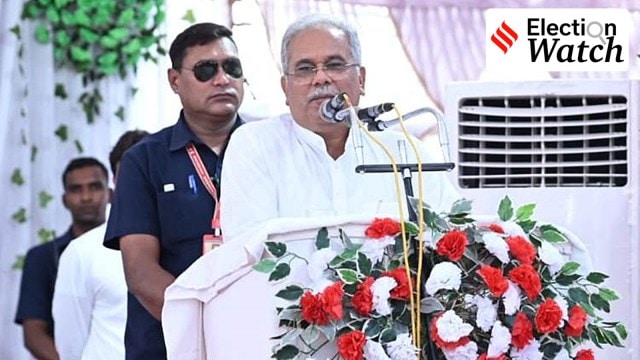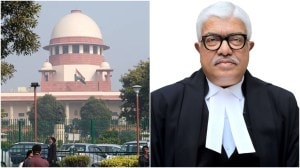Vikas Pathak is deputy associate editor with The Indian Express and writes on national politics. He has over 17 years of experience, and has worked earlier with The Hindustan Times and The Hindu, among other publications. He has covered the national BJP, some key central ministries and Parliament for years, and has covered the 2009 and 2019 Lok Sabha polls and many state assembly polls. He has interviewed many Union ministers and Chief Ministers. Vikas has taught as a full-time faculty member at Asian College of Journalism, Chennai; Symbiosis International University, Pune; Jio Institute, Navi Mumbai; and as a guest professor at Indian Institute of Mass Communication, New Delhi. Vikas has authored a book, Contesting Nationalisms: Hinduism, Secularism and Untouchability in Colonial Punjab (Primus, 2018), which has been widely reviewed by top academic journals and leading newspapers. He did his PhD, M Phil and MA from JNU, New Delhi, was Student of the Year (2005-06) at ACJ and gold medalist from University Rajasthan College in Jaipur in graduation. He has been invited to top academic institutions like JNU, St Stephen’s College, Delhi, and IIT Delhi as a guest speaker/panellist. ... Read More
Bhupesh Baghel and farm loan waiver give Congress advantage in Chhattisgarh, BJP catching up
Ahead of the first phase of voting on November 7, there is a distinct lack of interest in the election among voters and no pressing desire for change.
 From a security guard at a Raipur hotel to a family in the village of Pantora in Patan, where Chief Minister Bhupesh Baghel is in the fray, there is a marked lack of enthusiasm about the elections. (Facebook/Bhupesh Baghel)
From a security guard at a Raipur hotel to a family in the village of Pantora in Patan, where Chief Minister Bhupesh Baghel is in the fray, there is a marked lack of enthusiasm about the elections. (Facebook/Bhupesh Baghel) Travelling through Chhattisgarh, one thing becomes apparent. Though there is the usual humdrum that accompanies big elections — party flags, hoardings and checking of vehicles when one approaches constituencies that go to polls in the first phase on November 7 — among voters there is a marked lack of interest in the elections and no pressing desire for change.
This election, in short, is wave-less. The common sense on the streets about the Congress winning easily has given way to the “takkar hai (there is a contest)” refrain in some places. There is some disappointment with the state government but no express wish to bring the BJP back to power. From a security guard at a Raipur hotel to a family in the village of Pantora in Patan, where Chief Minister Bhupesh Baghel is in the fray, there is a marked lack of enthusiasm about the elections.
For the Congress, the biggest advantage is that, unlike its primary rival, it has a leader of the stature of Baghel leading from the front. The CM is the only state leader whose name crops up quite a few times in casual conversations. and he is widely visible in large cutouts across the state. For the BJP, its state leadership seems to have become invisible and only its candidates seem to be in the conversation at the constituency level.
Another problem that the BJP seems to have been confronted with is its election agenda. The party has yet to release its election manifesto — less than a week remains before the first phase of voting — but has made corruption a major issue since even those close to the CM have received summons from the Enforcement Directorate. This, however, does not seem to be resonating on the ground. The likeliest reason is that the anti-corruption pitch is now almost a decade old — it helped uproot the Congress-led United Progressive Alliance in the first place — and given that parties make it an issue in every state, it no longer registers in the mind of voters as a distinctive issue. For them, governance is made sense of in terms of the work done instead of corruption allegations.
This is where the Congress seems to be staying in the reckoning despite complaints of administrative laxity. What is resonating among people in the primarily agrarian state — according to NITI Aayog, 70% of Chhattisgarh’s population is engaged in agriculture — is the Congress’s promise of a farm loan waiver, something that most people in the state have come to associate with the party. Even some BJP supporters have been left wondering why their party is not making it the primary agenda to undercut the Congress in a battle of competitive welfarism.
“There are many paddy farmers in our region. We want the BJP candidate to win but if more farmers vote for the Congress, they will win,” said Bhagat Patel, a resident of Kawardha in Kabirdham district. In his constituency, where Law Minister Mohammad Akbar is the incumbent MLA, the BJP is pushing a Hindutva narrative to blunt the Congress’s efforts to retain the seat based on the agrarian welfare announcements of the government.
The discerning voter
In the last few years, one trend in Indian politics is that in the states where the BJP is strong, it does much better in the Lok Sabha elections than in the state polls. The only exception perhaps is Uttar Pradesh, where the party has a strong regional leader in Chief Minister Yogi Adityanath.
In Chhattisgarh, Rajasthan, and Madhya Pradesh the BJP got between 33% and 41% of the votes in the 2018 Assembly elections, losing all three. Five months later, its vote share rose to 51-59% in these states in the parliamentary elections. Similarly, the party’s 56% vote share in the Lok Sabha polls in Delhi went down to 38.5% in the 2020 Delhi Assembly elections. The BJP got 36% and 33% of the votes in the Haryana and Jharkhand Assembly polls but received more than half the votes in the parliamentary elections in both states.
So, while Narendra Modi does change equations in the Lok Sabha, Assembly elections are often fought on a different political landscape, with regional and local factors weighing on the minds of voters. This duality in voter behaviour is playing out in Chhattisgarh too, with several people saying that they will vote for Modi in 2024 but may not back the BJP in the Assembly polls.
The BJP has sought to counter this not by promoting a strong regional face but by drafting in Lok Sabha MPs to make some constituencies more winnable and adopting a “collective leadership” strategy. But this has led to Baghel being the only regional leader being discussed — even if not always in a positive light — as elections approach. And the result of all this is that the Congress seems somewhat ahead in the perception battle despite some signs of anti-incumbency and voter disinterest as the BJP has no state-level face who can match up to Baghel and enthuse voters.



- 01
- 02
- 03
- 04
- 05





























